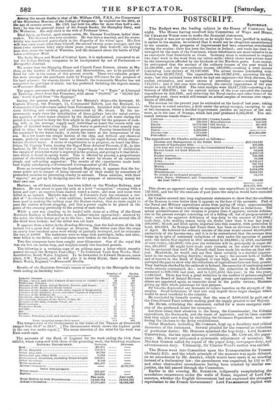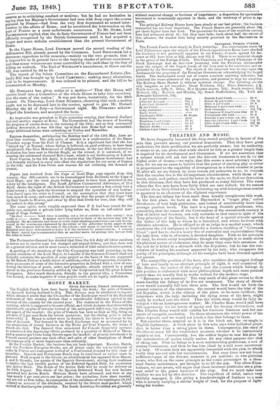POSTSCRIPT.
SATURDAY.
The Budget was the leading subject in the House of Commons last night The House having resolved into Committee of Ways and Means, Sir CHARLES WOOD rose to make the financial statement.
Although it was not so satisfactory as he might have been justified in making it earlier in the session, be believed that it would not be altogether unsatisfactory to the country. His prospects of improvement had been somewhat overclouded during the session: there has been the famine in Ireland ; and trade has been in- terrupted by the state of the Continent, whose inhabitants are more valuable to U8 as customers than formidable as rivals. Germany alone is understood to require two days' work in the week from our cotton-mills; which shows how serious must be the interruption afforded by the blockade of the Northern ports. Last session, he anticipated that the amount of the ordinary income of the year would be 51,550,000L, and the extraordinary income 580,000L—making a total income (excluding corn-duties) of 52,130,0001. The actual income (excluding corn- duties) was 52,067,7311. The expenditure was 53,287,1101., exceeding his esti- mate; but this included items which he had not expected—for Irish distress, Ca.. nadian emigration, and naval excess of preceding years—making together 713,7071.; and if this sum were deducted, the current expenditure of the year would be only 52,573,403/ The total receipts were 53,017,7321—showing a de- ficiency of 269,3781; but the current income of the year exceeded the current expenditure by 444,3291., and deducting the Naval excess and other items of the preceding year, there would still remain an actual surplus of revenue over expen- diture of 120,5421.
The revenue for the present year he estimated on the basis of last year; taking the figures in round numbers, a little under the actual receipts, excepting in one or two instances, where a decided improvement justifies an increase of the esti- mate, as in the case of Stamps, which last year produced 6,565,3641. The esti- mated revenue stands thus-
Costoms
£20,220,000
Crown Lands
£180,000 Corn 230,000 Miscellaneous 222.000 Excise 13,710,000 Old Stores 485,000 Stamps 6,750,000 Surplus Fees 90,00 Taxes 4,300,000
£52,262,000 Income-tax 5,275,000
Post-office 800,000
The expenditure Sir Charles estimated as follows— Interest and Management of the Public Debt £27,763,527 Interest of Exchequer Bile 430,000 Civil List and other Charges on the Consolidated Fund 2,781,556 Recent Grant for Irish Distress 50,000 Navy 6,260,740 Packet Service 748,296 Arctic Expedition 12,68a Army 6,142,211 Commissariat 531 872 Militia 113,000 Ordnance 2,654,270 Miscellaneous 3,924,731 To refund an escheated property 52,173 Army, Navy, Ordnance, and Commissariat " excesses " for the year 1847-9 642,632
£52,157, 696.
This shows an apparent surplus of receipts over expenditure to the amount of 736,9361., and but for the excesses of past years the surplus would have exceeded 1,100,0001.
Sir Charles entered into long explanatory statements to show that the condition of the finances is even better than it appears on the face of the accounts. Part of the Naval and Military expenditure arises from paying off ships, superannuating workmen, Sze.; for there is nothing so expensive in the Navy as redactions. The actual productiveness of the revenue is greater than it appears; certain deficien- cies in the present receipts consisting not of a falling-offi but of postponements of duty: such is the apparent deficiency of hop-duty to the amount of 196,0001.; malt-duty, (the making season being six weeks later than it was last year,) 200,0001.; Scotch and Irish spirits imported into this country, with permission to bond, 400,0001. In Stamps and Taxes there has been an increase since the 5th of April. He believed the ordinary income of the year would exceed 46,000,0001. exclusively of the Income-tax ; and it is to be remembered that the revenue thus keeps up in spite of continued reductions of duty under the operation of passed acts: the duties that expired in 1847 amounted to 344,8861.; in 1848, exclusively of corn-duties, 585,9681.; this year the reduction will be, principally in sugar-du- ties, 385,8651. He might have made some remarks on the state of the nation; but he postponed that until Mr. Disraeli shall have made his motion on that sub- ject. Meanwhile, he would only say that there certainly is a decided improve- ment in the manufacturing districts; money is easy; the amount both of bullion and of reserve in the Bank of England is very high, and increasing. He also surveyed the past to show why the reductions of expenditure have not been greater. They had been checked by the outbreak in Ireland, the necessity of continuing naval works already commenced, &c.: nevertheless, the reductions in the Estimates amounted to 828,7002. last year, and to 1,511,4551. this year; in the two years, 2,340,1551. There has been a great reduction in the number of persons employed under the Board of Inland Revenue: very aged persons are superannuated; but others are appointed again, as vacancies occur in the public service; Ministers giving np their whole patronage for that purpose. Sir Charles deprecated any demands to reduce taxation on the strength of the surplus. Small reductions of that sort only impede those larger changes which would be most beneficial to the country. He concluded by formally moving that the sum of 3,000,0001. be paid out of the Consolidated Fund towards making good the supply granted to her Majesty. Mr. HUME, criticizing the statement, called for a more energetic exer- cise of the professed desire for economy— Let them direct their attention to the Army, the Commissariat, the Colonial expenditure, the Dockyards, and the waste of materials; and let them consider that they might save money by abolishing the Ordnance Department, and trans- ferring the business to the Army establishment. Other Members, including Mr. COBDEN, kept up a desultory and critical discussion of the statement. Several pleaded for the removal or reduction of particular duties: Mr. HoDGEs attacked the hop-duty; Lord ROBERT GitosvExoa, the tax upon attorneys' certificates; Mr. COWAN, the paper- duty; Mr. Ewsitr advocated a systematic adjustment of taxation; Mr. MILNER GIBSON called for repeal of the paper-duty, newspaper-duty, and advertisement-duty. Ultimately, Sir Charles Wood's motion was carried.
The House went into Committee upon the Transportation for Treason (Ireland) Bill; and the whole principle of the measure was again debated, on an amendment by Mr. ANSTEY, which would have made it an enacting instead of a declaratory law: the amendment was negatived, by 151 to 27; and other obstructive amendments having been crushed by similar ma- jorities, the bill passed through the Committee. Earlier in the evening, Mr. ROEBUCK, indignantly recapitulating the scandalous occurrences under the walls of Rome, inquired of Lord Pal- merston, whether the English Government had not expressed the strongest reprobation to the French Government? Lord PALMERSTON replied with reserve as to criticizing conduct or motives; but he had no hesitation in saying that her Majesty's Government had seen with deep regret the course pursued by France—had from the very first deprecated an armed inter- vention in the affairs of Rome; and he considered the intervention on the part of France as a most unfortunate occurrence. To Mr. Holtz, Lord PALMERSTON replied, that the de facto Government of France had not been officially recognized by the British Government until it had acquired a longer and more definite establishment than the present Government of
Roma
In the Upper House, Lord DENMAN moved the second reading of the Affirmation Bill, already passed by the Commons. Lord BROUGHAM led a strenuous opposition to the measure,—mainly on the two grounds, that it is impossible to fit general laws to the varying shades of private conscience; and that many witnesses are more controlled by the oath than by the fear of telling an untruth. The Earl of WicmLow's amendment, to throw out the bill, was carried by 34 to 10. The report of the Select Committee on the Encumbered Estates (Ire- land) Bill was brought up by Lord CAMPBELL; making many alterations, said to be improvements. It was ordered to be printed, and the bill to be recommitted on Monday.
Mr. DISRAELI has given notice of a motion—" That this House will resolve itself into a Committee of the whole House to take into considera- tion the state of the nation." It was put down, tentatively, for the 26th instant. On Thursday, Lord Jona; RUSSELL, observing that such a motion ought not to be discussed late in the session, agreed to give Mr. Disraeli Monday the 2d of July—a Government night. Mr. DISRAELI acknow- ledged the kindness, and accepted the boon.



























 Previous page
Previous page